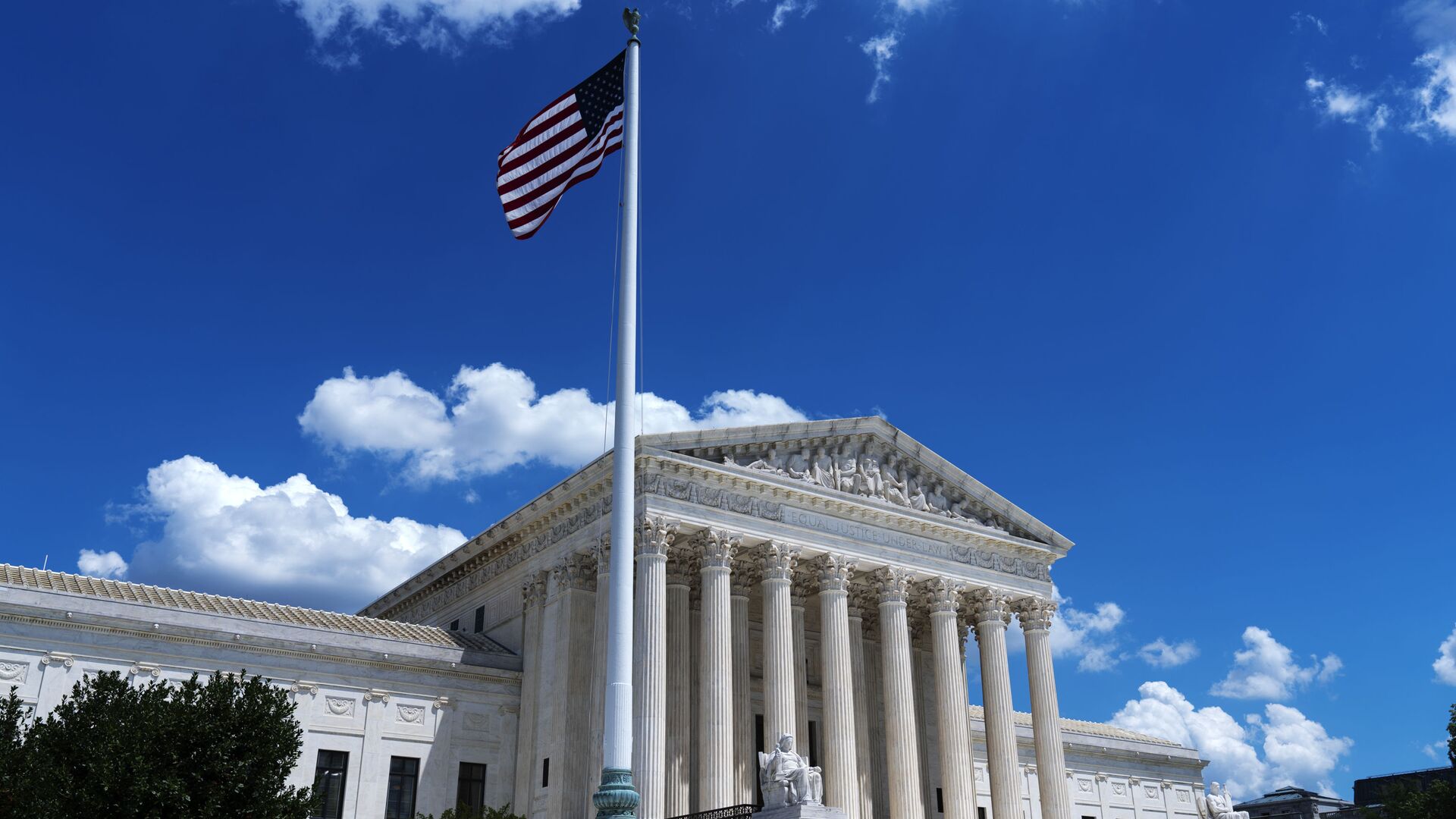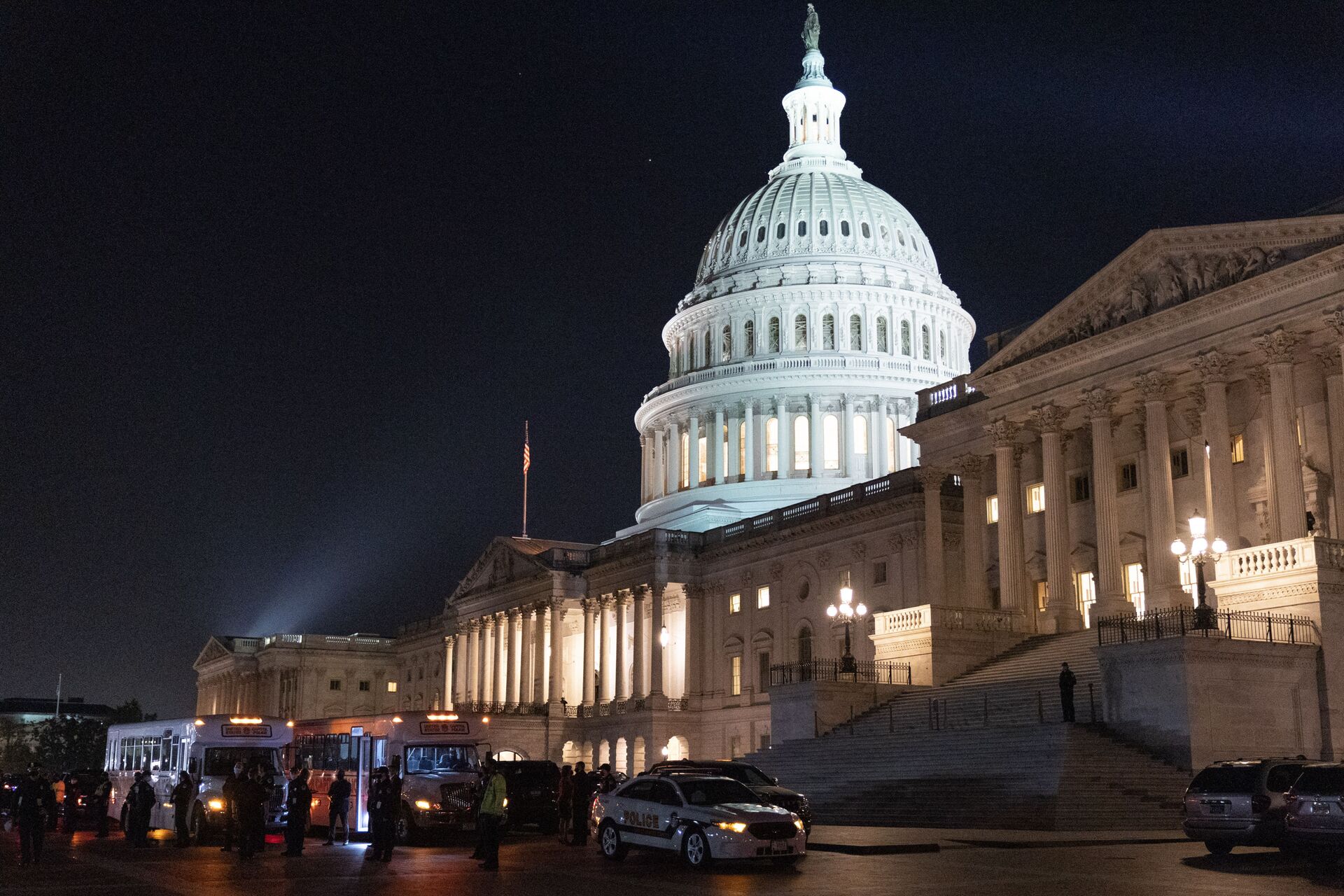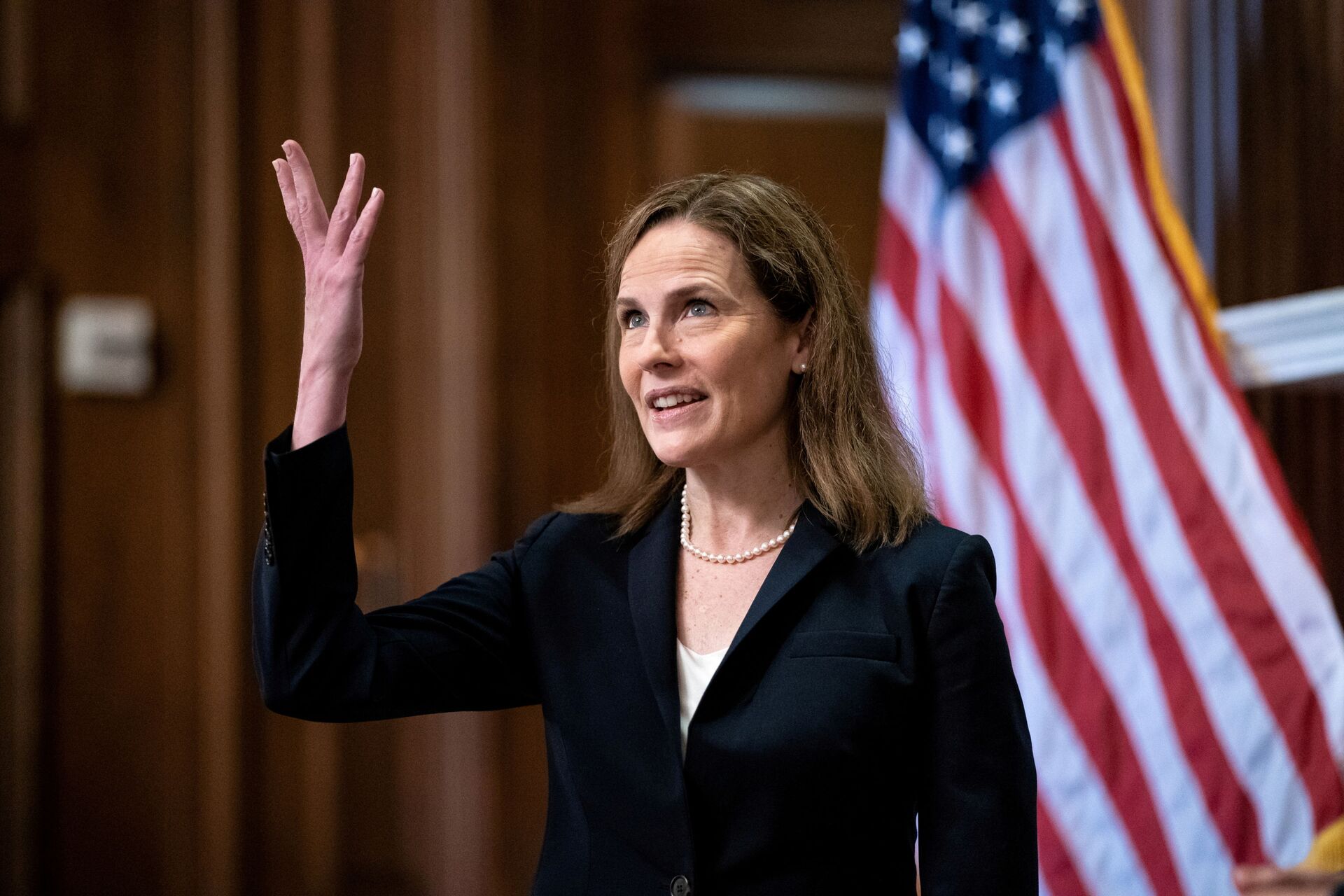https://sputnikglobe.com/20211015/biden-commission-split-on-expanding-supreme-court-but-says-justices-tenure-merits-consideration-1089941055.html
Biden Commission Split on Expanding Supreme Court But Says Justices’ Tenure 'Merits Consideration’
Biden Commission Split on Expanding Supreme Court But Says Justices’ Tenure 'Merits Consideration’
Sputnik International
US President Joe Biden signed an executive order on 9 April to set up a bipartisan commission tasked with studying US Supreme Court reform, including examining... 15.10.2021, Sputnik International
2021-10-15T07:35+0000
2021-10-15T07:35+0000
2022-10-19T20:34+0000
joe biden
supreme court
newsfeed
us
amy coney barrett
congress
https://cdn1.img.sputnikglobe.com/img/07e5/07/01/1083285915_0:160:3073:1888_1920x0_80_0_0_872bd27a8e4fc0a8e18bf2681975de75.jpg
The Presidential Commission on the Supreme Court of the United States on Thursday released its initial findings, revealing that members of the 30-odd group were divided on the politically-charged issue of expanding the number of justices.The bipartisan commission, created by President Joe Biden in April and entrusted with presenting a final report to the POTUS by mid-November, while laying out arguments around reforming the Supreme Court, stopped short of making any recommendations.It agreed that Congress possesses the legal power to pack the nine-member Supreme Court with more justices, but displayed no consensus on whether lawmakers should do so.Some of the commissioners agreed with pro-expansion arguments “at least in part”. Others in the group, co-chaired by former White House counsel Bob Bauer and former Deputy Assistant Attorney General Cristina Rodríguez, and comprising legal and other scholars, as well as former federal judges, said that court expansion could "undermine, rather than enhance, the Supreme Court’s legitimacy and its role in the constitutional system”.It was added that recent polls suggested a majority of the public did not support court expansion.“And as even some supporters of court expansion acknowledged during the commission’s public hearings, the reform - at least if it were done in the near term and all at once - would be perceived by many as a partisan manoeuvre,” concluded the documents.The commission, which was originally never mandated to produce actual recommendations, also laid out various potential scenarios for increasing the size of the court, such as gradually or in one stroke. It also addressed other proposed ideas, such as the length of service and turnover of justices and having them associated with political parties.The team was closer to a consensus on the issue of imposing term limits on the justices.It added that Chief Justice John G. Roberts Jr. and Justices Breyer and Elena Kagan “noted the potential benefits of term limits.” The commission is meeting this Friday to discuss the draft “discussion materials” and begin work on a draft report, to be considered at a separate meeting. The initial response to the released findings has been split, as progressive groups voiced frustration. “This was not even close to being worth the wait. The paralysis-by-analysis reflected here is exactly what you would expect from a commission made up mostly of academics, including several die-hard conservatives who are fully content with the status quo,” Brian Fallon, the executive director of Demand Justice advocacy group, was cited as saying by The New York Times. The released initial findings of the commission were slammed by conservative groups. The commission is meeting this Friday to discuss the draft “discussion materials” and begin work on a draft report, to be considered at a separate meeting.Supreme Court DebateDemocrat Joe Biden set up the commission in April, following through on his campaign pledge as then-presidential candidate running against Republican Donald Trump. The group of 36 experts was to examine the the genesis of the reform debate; the Court's role in the Constitutional system; the length of service and turnover of justices on the Court; the Court's case selection, rules, and practices; the membership and size of the Court.While the US Constitution does not specify how many justices should be on the Supreme Court that number has remained at nine since 1869.Biden had been pressured by liberals to add justices as former US President Donald Trump appointed three conservative judges to the US Supreme Court's nine-member bench: Neil Gorsuch, Brett Kavanaugh, and Amy Coney Barrett. Left-leaning politicians and pundits advocated increasing the number of justices to “neutralise” what some suggest is a "conservative" bias as this term the Supreme Court is set to deliver rulings in cases rooted in politically polarising issues, such as abortion and guns.Amid accusations by Republicans that he would “pack” the court with liberal justices if elected, the-then candidate to the Oval Office stated in an October 2020 appearance on CBS’ 60 Minutes:The commission’s findings are released as the nation's highest court faces all-time low Gallup poll approval ratings, down from 49% in July to 40%. The poll was conducted shortly after the Supreme Court declined to block the controversial Texas abortion law.
Sputnik International
feedback@sputniknews.com
+74956456601
MIA „Rossiya Segodnya“
2021
News
en_EN
Sputnik International
feedback@sputniknews.com
+74956456601
MIA „Rossiya Segodnya“
Sputnik International
feedback@sputniknews.com
+74956456601
MIA „Rossiya Segodnya“
joe biden, supreme court, newsfeed, us, amy coney barrett, congress
joe biden, supreme court, newsfeed, us, amy coney barrett, congress
Biden Commission Split on Expanding Supreme Court But Says Justices’ Tenure 'Merits Consideration’
07:35 GMT 15.10.2021 (Updated: 20:34 GMT 19.10.2022) US President Joe Biden signed an executive order on 9 April to set up a bipartisan commission tasked with studying US Supreme Court reform, including examining the size of the court, which now has a 6-3 Conservative majority, and the justices' lifetime appointments.
The Presidential Commission on the Supreme Court of the United States on Thursday released its
initial findings, revealing that members of the 30-odd group were divided on the politically-charged issue of expanding the number of justices.
The bipartisan commission, created by President Joe Biden in April and entrusted with presenting a final report to the POTUS by mid-November, while laying out arguments around reforming the Supreme Court, stopped short of making any recommendations.
It agreed that Congress possesses the legal power to pack the nine-member Supreme Court with more justices, but displayed no consensus on whether lawmakers should do so.
“As a legal matter, we conclude that Congress has broad power to structure the Supreme Court by expanding (or contracting) the number of Justices. The prudential question is more difficult, and Commissioners are divided on whether Court expansion would be wise," the materials stated.
Some of the commissioners agreed with pro-expansion arguments “at least in part”. Others in the group, co-chaired by former White House counsel Bob Bauer and former Deputy Assistant Attorney General Cristina Rodríguez, and comprising legal and other scholars, as well as former federal judges, said that court expansion could "undermine, rather than enhance, the Supreme Court’s legitimacy and its role in the constitutional system”.
“There are significant reasons to be sceptical that expansion would serve democratic values. We also raise some tentative concerns about how expansion of the Supreme Court might be received in the broader domestic and international community,” stated the findings.
It was added that recent polls suggested a majority of the public did not support court expansion.
“And as even some supporters of court expansion acknowledged during the commission’s public hearings, the reform - at least if it were done in the near term and all at once - would be perceived by many as a partisan manoeuvre,” concluded the documents.
The commission, which was originally never mandated to produce actual recommendations, also laid out various potential scenarios for increasing the size of the court, such as gradually or in one stroke. It
also addressed other proposed ideas, such as the length of service and turnover of justices and having them associated with political parties.
The team was closer to a consensus on the issue of imposing term limits on the justices.
“A bipartisan group of experienced Supreme Court practitioners who testified before the commission concluded that an 18-year term limit “warrants serious consideration,”” another draft paper from the commission’s working group said.
It added that Chief Justice John G. Roberts Jr. and Justices Breyer and Elena Kagan “noted the potential benefits of term limits.”
The commission is meeting this Friday to discuss the draft “discussion materials” and begin work on a draft report, to be considered at a separate meeting.
The initial response to the released findings has been split, as progressive groups voiced frustration.
“This was not even close to being worth the wait. The paralysis-by-analysis reflected here is exactly what you would expect from a commission made up mostly of academics, including several die-hard conservatives who are fully content with the status quo,” Brian Fallon, the executive director of Demand Justice advocacy group, was cited as saying by The New York Times.
The released initial findings of the commission were slammed by conservative groups.
“Far-left progressives are clearly trying to expand their political power under the guise of ‘court reform,’ destroying the independence of our judiciary and threatening the civil liberties of all Americans,” stated Kelly Shackelford, the president of non-profit legal organisation First Liberty Institute.
The commission is meeting this Friday to discuss the draft “discussion materials” and begin work on a draft report, to be considered at a separate meeting.
Democrat Joe Biden
set up the commission in April, following through on his campaign pledge as then-presidential candidate running against Republican Donald Trump. The group of 36 experts was to examine the the genesis of the reform debate; the Court's role in the Constitutional system; the length of service and turnover of justices on the Court; the Court's case selection, rules, and practices; the membership and size of the Court.
While the US Constitution does not specify how many justices should be on the Supreme Court that number has remained at nine since 1869.
Biden had been pressured by liberals to add justices as former US President Donald Trump
appointed three conservative judges to the US Supreme Court's nine-member bench: Neil Gorsuch, Brett Kavanaugh, and Amy Coney Barrett.
Left-leaning politicians and pundits advocated increasing the number of justices to “neutralise” what some suggest is a "conservative" bias as this term the Supreme Court is set to deliver rulings in cases rooted in politically polarising issues, such as abortion and guns.
Amid accusations by Republicans that he
would “pack” the court with liberal justices if elected, the-then candidate to the Oval Office stated in an October 2020 appearance on CBS’ 60 Minutes:
"It's not about court packing. There's a number of other things that our constitutional scholars have debated, and I've looked to see what recommendations that commission might make."
The commission’s findings are released as the nation's highest court faces
all-time low Gallup poll approval
ratings, down from 49% in July to 40%. The poll was conducted shortly after the Supreme Court declined to block the controversial
Texas abortion law.



